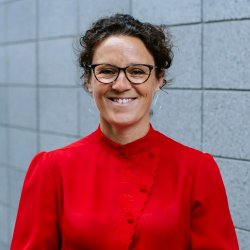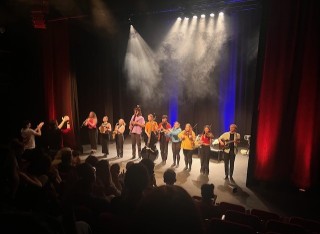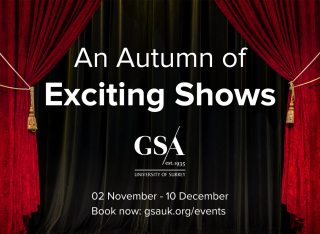
Professor Catherine McNamara
Academic and research departments
About
Biography
An academic from a professional background in Applied Theatre and Drama Education, I am Head of GSA at the University of Surrey. I have a key role in ensuring that students have a high quality experience at the institution as they move towards careers in the creative and cultural sector. My work as Head of School involves overseeing the strategic and operational work that our 50+ staff and 650 students are undertaking within and outside of the University.
After graduation, I did an MA in Drama and Theatre at Royal Holloway, University of London and a PGCE Drama at Central School of Speech and Drama. After several years teaching A Level and BTEC theatre and performance courses in Further Education and doing some teaching at Royal Holloway, I joined Central in 2003 as a Lecturer on the PGCE Drama programme. While there, I held various roles including Course Leader of the MA Applied Theatre (Drama in the Community & Drama Education) and latterly, Director of Learning, Teaching & Student Experience. I worked at the University of Portsmouth 2019 - 2022 as Head of School (Art, Design and Performance) within the Faculty of Creative and Cultural Industries.
I was a project partner in the Wellcome Trust funded 'Rethinking Sexology' project based at the University of Exeter which to the Transformations: Encountering Gender and Science Public Engagement project. I also led the TransActing project which was a collaboration with The Royal Central School of Speech and Drama and Gendered Intelligence. I am currently the Project Lead for Tackling Child Criminal Exploitation: An Arts-based Approach.
I supervise PhD work in the areas of Applied Theatre, gender studies, trans and nonbinary experiences and education.
I am a co-founder of Gendered Intelligence, an organisation that works to improve the lives of trans, non-binary and gender diverse people. Inclusivity is a core principle in my work. I have been a member of the Board for the New Theatre Royal, Portsmouth and am currently a member of the Surrey Cultural Partnership.
University roles and responsibilities
- Head of Guildford School of Acting
- Member of the Faculty of Arts & Social Sciences Equality, Diversity & Inclusion committee
- Member of the University Academic Leaders Forum
Previous roles
Acting-Dean (sabbatical cover 01 Jan 2018 – 16 April 2018)
Pro-Dean (Students) 2012-2015
Deputy Dean of Studies (2009-2012)
Deputy Head of Postgraduate Studies (2007-2009)
Course Leader of the MA Applied Theatre (Drama in the Community & Drama
Education) and Postgraduate Certificate Directing Text with Young People
(2004-2007)
Course Leader of the PGCE Drama (Secondary) (2003-2006)
News
In the media
ResearchResearch interests
My work has included practice research into the benefits of voice workshops for transgender communities, a collaborative play-writing project run in conjunction with Fringe Benefits Theatre Company (Los Angeles, US), which led to a performance and workshop being delivered nationally (2008-2011), INTERarts, an intergenerational arts project with Lesbian, Gay, Bisexual, Trans and Queer identified people and more recently the TransActing project, a collaboration between the Royal Central School of Speech and Drama, My Genderation and Gendered Intelligence.
My work usually involves engagement with community participants as a significant element. My work was the focus of an Impact Case Study in REF2014 for example. The research I undertake informs and is informed by my arts practice with a wide range of collaborators and participants.
My current project explores the ways that the arts can be used to help tackle Child Criminal Exploitation. The project uses a freely available arts-based intervention - a digital, interactive story (Cold Chips & Money). This resource has been used in school and youth settings in Hampshire, Surrey and the Isle of Wight with approximately 2000 young people aged 11 – 14. I am the Project Lead and oversaw the development of the story, the supporting resources and the evaluation framework. For more information about project partners, team members and evaluation, see https://coldchipsandmoney.uk/
Cold Chips & Money was designed to help students understand, recognise and manage external influence and pressure. The story and supporting resources which include a lesson plan and access to the project evaluation lead, enable professionals to have conversations with young people about how they can keep themselves safe, as well as how they can support one another to resist unwanted attention that might lead to exploitation. The resources relate directly to PSHE Association Key Stage 3 Core Theme Relationships: Social Influence section R42-47. The development and use of the resources was planned to complement Hampshire and the Isle of Wight borough’s ongoing multi-agency work on Child Criminal Exploitation, County Lines, gangs and youth violence and had input from multiple professionals.
Other publications include ‘Methods and Approaches for Working with Trans, Non-binary and Gender Diverse Young People in the UK’ in The Handbook of Youth Work Practice, Eds. Pam Alldred, Fiona Cullen et al, London: SAGE (2018) and ‘A Complex Matrix of Identities: Working Intergenerationally with LGBTQ people’ in Minding the Knowledge Gap, eds. Sue Westwood and Andrew King, London: Routledge (2018).
Research interests
My work has included practice research into the benefits of voice workshops for transgender communities, a collaborative play-writing project run in conjunction with Fringe Benefits Theatre Company (Los Angeles, US), which led to a performance and workshop being delivered nationally (2008-2011), INTERarts, an intergenerational arts project with Lesbian, Gay, Bisexual, Trans and Queer identified people and more recently the TransActing project, a collaboration between the Royal Central School of Speech and Drama, My Genderation and Gendered Intelligence.
My work usually involves engagement with community participants as a significant element. My work was the focus of an Impact Case Study in REF2014 for example. The research I undertake informs and is informed by my arts practice with a wide range of collaborators and participants.
My current project explores the ways that the arts can be used to help tackle Child Criminal Exploitation. The project uses a freely available arts-based intervention - a digital, interactive story (Cold Chips & Money). This resource has been used in school and youth settings in Hampshire, Surrey and the Isle of Wight with approximately 2000 young people aged 11 – 14. I am the Project Lead and oversaw the development of the story, the supporting resources and the evaluation framework. For more information about project partners, team members and evaluation, see https://coldchipsandmoney.uk/
Cold Chips & Money was designed to help students understand, recognise and manage external influence and pressure. The story and supporting resources which include a lesson plan and access to the project evaluation lead, enable professionals to have conversations with young people about how they can keep themselves safe, as well as how they can support one another to resist unwanted attention that might lead to exploitation. The resources relate directly to PSHE Association Key Stage 3 Core Theme Relationships: Social Influence section R42-47. The development and use of the resources was planned to complement Hampshire and the Isle of Wight borough’s ongoing multi-agency work on Child Criminal Exploitation, County Lines, gangs and youth violence and had input from multiple professionals.
Other publications include ‘Methods and Approaches for Working with Trans, Non-binary and Gender Diverse Young People in the UK’ in The Handbook of Youth Work Practice, Eds. Pam Alldred, Fiona Cullen et al, London: SAGE (2018) and ‘A Complex Matrix of Identities: Working Intergenerationally with LGBTQ people’ in Minding the Knowledge Gap, eds. Sue Westwood and Andrew King, London: Routledge (2018).
Supervision
Postgraduate research supervision
Supervision of successfully completed PhD theses:
Jessica Hartley, Guided Practices in Facing Danger: Experiences of Teaching Risk
Georgia Bowers, Examining the impact of applied theatre with older adults in England
Eiman Husain, Women, digital media and conservative cultural norms: the case of Kuwait (supervisor Feb 2019 - March 2020)
Current supervision:
Will Hudson, Between performance and authenticity: examining a 'spectrum of masculinities' through psychophysical, therapeutic and applied theatre practices.
Phil Sanger, Queering Exactitude: Life-coaching as an applied dramaturgy.
Publications
This article discusses the efficacy of a freely available arts-based intervention used to tackle Child Criminal Exploitation. A digital, interactive story (Cold Chips & Money) was used in school and youth settings in Hampshire, England with 1,451 young people aged 11–13 in 2021 as part of a project of the same name. Its use has continued since. I was and continue to be the Project Lead and oversaw the development of the story, the supporting resources and the evaluation framework. I worked with a project facilitator and evaluator throughout. Cold Chips & Money was designed to help students understand, recognise and manage external influence and pressure. The story and supporting resources which included a lesson plan and access to the project evaluation lead, enable professionals to have conversations with young people about how they can keep themselves safe, as well as how they can support one another to resist unwanted attention that might lead to exploitation. The resources relate directly to the PSHE Association Key Stage 3 Core Theme Relationships: Social Influence section R42–47. The development and use of the resources was planned to complement multi-agency work on Child Criminal Exploitation and County Lines and had input from multiple professionals. Project evaluation evidenced a significant increase in awareness of county lines, and the issues surrounding it. Teachers stated that the interactive storytelling format was effective at and provided the opportunity to facilitate in-depth dialogue around the cause and effect of the decisions we make.
This essay explores a collaborative Theatre for Social Justice project that took place in London, United Kingdom, in 2008 and involved fifty participants. The key question we ask is, What are the key challenges when bringing student and community participants together to create theatre? We will start by outlining the nature of the international collaboration and then will unpack some of the tensions that emerged during the process of making a play and in relation to the play as product of the process. We will conclude by considering to what extent we were successful in creating quality art and effective theatre, playfully questioning whether this project was a creative success or a site of carnage.
This short piece discusses a project on Child Criminal Exploitation (CCE), County Lines, gangs and youth violence for which I am Project Lead. In working in partnership with Active Communities Network the aim is to complement the multi-agency work already in place in the region of Hampshire. The team includes artists, students, academics and professionals in policing, safeguarding and youth offending. The project exchanges knowledge in order to create a resource that will meet the needs of all partners in their mission to raise awareness and prevent children from being exploited.
This chapter presents an example of youth work practice with young trans and/ or non-binary people in the UK. The chapter uses the work of the organisation Gendered Intelligence as its focus and highlights a number of aspects of good practice and specific challenges that have arisen when working with young people who identify as transgender in some way. The youth group provision under discussion includes monthly sessions for trans and non-binary youth in London, Leeds and Bristol. The practice is contextualised in relation to work with young trans people in other countries. The three priorities for this youth work practice which re-values stigmatised identities are: to reduce isolation; to increase young trans people’s sense of pride in their gender identities; to increase young people’s ability to manage difficult situations. The chapter seeks to consolidate findings from the Gendered Intelligence youth group project into a model of practice that might be used by other practitioner-researchers in this and cognate fields.
This article presents a case study of good practice to demonstrate the ways in which some schools are meeting the Public Sector Equality Duty in relation to the support they provide for young people who are expressing gender variance or are identifying as transgender or genderqueer . This article will also identify common examples of practice in schools where discrimination on the basis of a young person's gender identity occurs. These concrete examples enable a reflection on how procedures, policies and practices relating to the Public Sector Equality Duty, with specific regard to gender reassignment, can impact positively on young people's individual experiences of being part of an institution's community. The examples also seek to demonstrate the detrimental impact that poor practice, or a lack of support and intervention can have on young people in school settings
Adventures in Time and Gender is a collaborative trans history project that brought together trans and non-binary writers, artists, young people, youth workers as well as humanities academics. It resulted in an original drama podcast and a new website hosting a range of creative works and newly commissioned writing by trans and non-binary artists and performers. This chapter explains the approach to co-production that informed the project. It introduces the methods of creative engagement and interpretation of historical sources developed by the project team and examines the benefits and challenges of working across different communities representing various forms of expertise and experience. The chapter also outlines the impact of the project on the different collaborators and audiences, including young people, academic researchers, youth workers, artists, therapists and clinicians.
This chapter presents the TransActing project as a deeply trans-inclusive practice within the creative and cultural sector in the UK and beyond. It articulates the ways that this project seeks to create opportunities for trans and non-binary people to access creative processes and networks. From this beginning, the project aimed to develop and deliver high quality trans-inclusive performer training with trans, non-binary and gender diverse participants and thus to nurture the creativity and talent of participants. Participants in the TransActing project described the experience of wanting to enter into these spaces but feeling a lack of confidence to do so. TransActing project participants described feeling vulnerable at the idea of trying to enter into these creative spaces and a perception that they were not accessible to them as trans people. In 2018, the TransArte Festival organisers based in Rio de Janeiro secured British Council funding to invite the TransActing project over to Brazil.
Through this research, I asked young people directly about the value they placed on such education and participation in the arts – what was it worth to them? The report outlines the findings from the project and they inform the recruitment, attainment, retention and experiences of young people from lower socio-economic backgrounds. The report and the findings would be of interest to small, specialist performing arts education providers and other HE institutions involved in offering art, design and performance education and organisations involved in wider arts practices, including visual arts and dance with a view to mobilising the efforts of all organisations supporting young people’s journeys into training.
In 2012 Central School of Speech & Drama received funding from the Higher Education Academy (HEA) to carry out research into the experiences of their Black and Minority Ethnic (BME) Students. The research included a review of pre-existing reports of the experiences of BME students in Higher Education as well as qualitative interviews with fifteen third year students and five staff members at the university. Of the students interviewed all categorised themselves as BME whereas the staff were mostly some variant of White British. This research project has enabled direct engagement with BME students and facilitated hearing in depth their experiences of work and study at the institution. The first section of the report outlines the project's aims rationale and methodology as well as well discussing how ethnicity and race are defined in the context of this research. The second section provides an account of the findings from the interviews together with an analysis of the findings which draws upon the data from the transcripts.
The INTERarts site provides a resource for Applied Theatre practitioners and arts workshop facilitators. It contains information about the INTERarts LGBTQ intergenerational project, the team of facilitators who were involved as well as some of the participants. The site presents documentation of the exhibition that took place on 4th December 2011. It also offers information on the pedagogic strategies we employed when planning and delivering the project as well as reflection and analysis of the findings from this work (Research Dimension tab). The project mobilized high quality exchange, collaboration and creative outputs among the groups of participants. The research dimension of this site explores the most effective strategies for intergenerational engagement within LGBTQ communities.
This text offers a synthesis of perspectives on lesbian, gay, bisexual. and trans (LGBT) ageing issues, as well as a critical analysis of both what is known about LGBT ageing and what is not yet known.
Society dictates that people fall into one of two sexual identities: male or female. For some people, though, sex is not so clear-cut. They may have an intersex condition or feel that there is a mismatch between their biological sex and the gender they perceive themselves to be. Catherine McNamara and Alison Rooke describe here a project in which a group of transsexual and transgendered young people were able to explore textendash and challenge textendash the biological determinants and medical understanding of sex and gender, and also to express their perceptions through performance. As well as helping the young people to make more sense of their sexed and gendered identities, the project enabled them to communicate a picture of transgendered lived experience that goes beyond limited scientific and medical descriptions.
This chapter contends that the awkward positions implicit in applied theatre research and practice provide useful perspectives from which to re-examine relationships between theory, practice and research that underpin wider knowledge-making practices in theatre and performance and the epistemological and ontological assumptions that underpin those practices. Applied theatre's responsiveness to invitations to practice and research in diverse contexts and its commitment to effecting social change complicates any easy categorisation of 'method' of practice and research. The chapter argues that different ways of thinking and doing implicit in applied theatre research and practice may be profoundly reflective of a contemporary moment. This moment is characterised by the contestation of overarching political and/or philosophical explanatory frameworks and evidence of global upheaval that has made the search for responsive, embedded and ethical knowledge practices a pressing imperative. The first part of the chapter provides a philosophical and theoretical positioning using a discussion of two prevalent 'modes' of research in applied theatre, namely broadly conventional social science research and reflective practitioner/action research modes. The second part of the chapter explores three case studies that exhibit distinct approaches to applied theatre research but that overlap in very instructive ways in the methodological and epistemological challenges and questions they generated
This article is a consideration of the ways that transgender performers and queer bodies in performance contribute to the ongoing formation of the category of gender. It explores the relationship between performing transgendered masculinities and the constitutive potential of the law (namely the Gender Recognition Act 2004) surrounding (trans)gender identity. The article looks at examples of performance by transgender performance artists, Jason Barker staged as part of the annual Transfabulous International Festival of Transgender Arts in 2006 and 2007 and Lazlo Pearlman in He Was a Sailor, the Sea Was Inside Him (Drill Hall, London, 2007). Trans and queer performance work is still, for the most part, left out of academic discourse within performance studies. Engaging with trans art and trans artists in relation to shifts in legislation around gender brings very specific readings into the public domain. This record of performance that takes place beyond the mainstream brings transgender and genderqueer performance practice to the fore.








